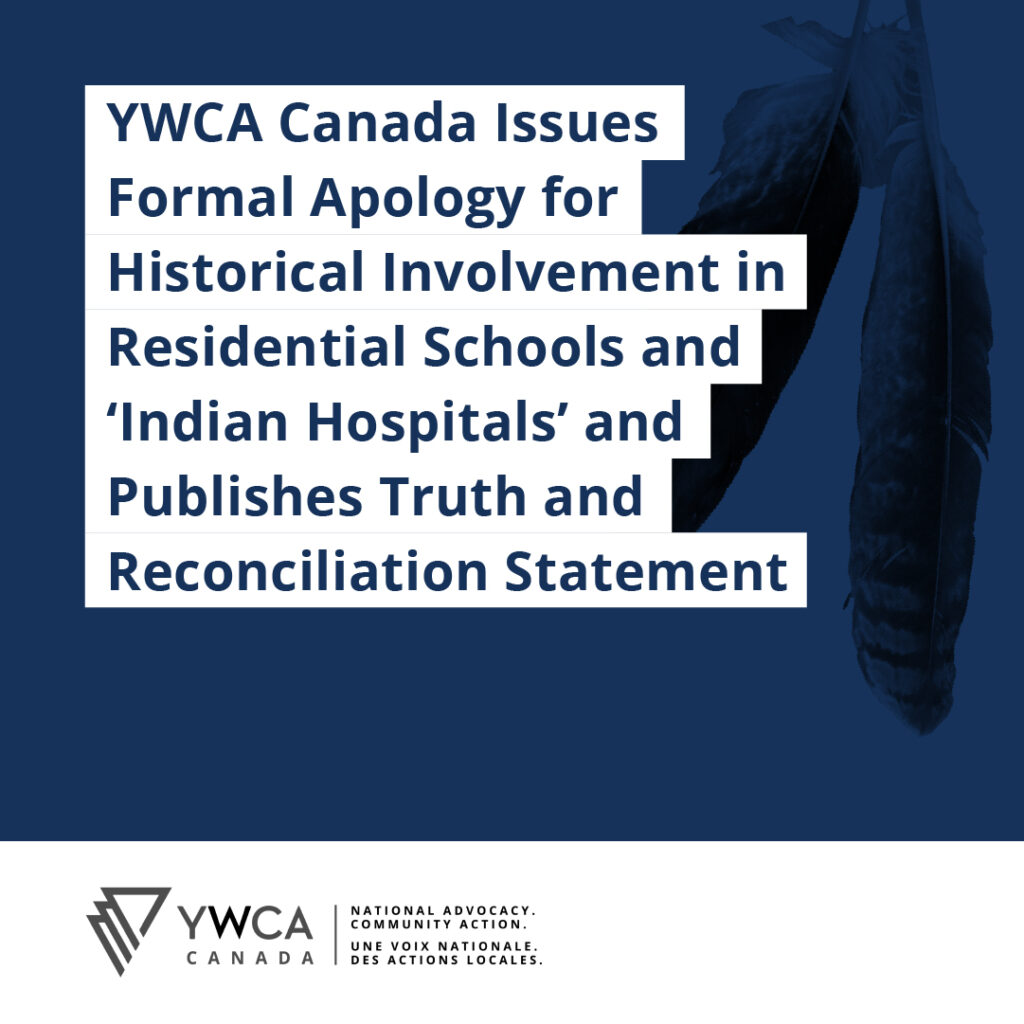Toronto (Treaty 13 territory)
Today, YWCA Canada issued a formal apology to Indigenous communities for YWCA Canada’s involvement in the programs offered at Residential Schools and Indian Hospitals. Our organization’s role in curriculum development, government relations programming, and program facilitation at residential schools and Indian Hospitals is a painful chapter that we must confront with openness and honesty. In addition, YWCA Canada issued a Truth and Reconciliation Statement affirming its commitment to truth-telling as a foundational step towards reconciliation with Indigenous Peoples; and emphasizing the organization’s responsibility in addressing the lasting impacts of these institutions.
As part of our commitment to Truth and Reconciliation, YWCA Canada offers a sincere and unreserved apology to the Indigenous communities, families, and individuals who were harmed by YWCA Canada’s involvement in these institutions. We deeply regret the suffering and trauma that were inflicted because of our organization’s actions and acknowledge the enduring pain that continues to affect Survivors and their descendants. We are profoundly sorry for the role YWCA Canada played in perpetuating these injustices.
As part of this commitment, YWCA Canada is also publishing a Summary Report based on preliminary research on the “The Role of YWCA Canada in Canada’s Residential Schools and Indian Hospitals” (referred to as the ‘Preliminary YWCA Canada’s Truth Report’). This independently produced document marks the beginning of YWCA Canada’s journey to confront its legacy, take ownership of past harms, and promote accountability and healing. This report is preliminary because further community participatory engagement and healing work is already underway by YWCA Canada, guided by Indigenous leaders, both internal and external to the YWCA movement.
“As we have embarked on a journey towards meaningful reconciliation with Indigenous Peoples, YWCA Canada is taking ownership of the harms caused as part of our legacy as a historically colonial institution with faith-based origins that were used to assimilate Indigenous communities,” said Aline Nizigama, Chief Executive Officer of YWCA Canada. “YWCA Canada offers a sincere apology for the role we played, and is sharing a renewed commitment to truth and reconciliation. We are sharing the summary archival research report with details on how our organization participated in harms, because truth-telling is a foundational step on our journey towards reconciliation.”
Over the last three decades, YWCA Canada has been operating as an inclusive secular organization and formally adopted YWCA Canada as its legal name (moving away from the Young Women’s Christian Association of Canada full name).
After Dr. Kristin Burnett and Dr. Shannon Stettner submitted the Report in May 2022, YWCA Canada committed to a period of self-reflection and due diligence. In order to ensure that the organization shared the research findings responsibly, we embarked on a process of direct engagement with affected Indigenous communities that sought to honour their stated goals. The decision to publish a summary report came as a result of guidance from deep Indigenous community engagement and through ceremony, and guidance from YWCA Canada’s Truth and Reconciliation Action Committee (TRAC) and Indigenous Circle. Established in 2016 and reignited in 2023, the TRAC brings together YWCA Indigenous and non-Indigenous members to develop and steer a national reconciliation action plan while the Indigenous Circle emerged in 2023 as a resource group and safe space for Indigenous YWCA staff and volunteers.
YWCA Canada acknowledges the limitations of this preliminary research and report, and has undertaken more work to address them. Some of the steps underway include a moratorium on archive destruction across YWCA sites; the creation of an Equity, Reconciliation, and Antiracism department at YWCA Canada to oversee this work; as well as adequately resourcing further Indigenous-led participatory engagement and healing work to shape a Reconciliation Action Plan that will guide our work, centering Indigenous voices and experiences.
YWCA Canada will offer cultural support (such as access to ceremony, prayer, and traditional healing with Indigenous Elders) to Indigenous staff, volunteers, and community members impacted by our work across the country. YWCA Canada welcomes dialogue with impacted Indigenous communities. More information on how to access support is outlined at the bottom of this press release. The summary report also stresses the commitment shared by YWCA Canada and local YWCAs across the country to supporting Indigenous communities – including staff, volunteers, and community members.
“We are publishing this report as one step towards acknowledging the harms done, fulfilling our commitment to truth-telling, and advancing our commitment to reconciliation,” said Denise Christopherson, YWCA Canada’s Board Chair. “YWCA Canada is committed to supporting learning and change as we work towards a future built on transparency, respect, and justice. Publishing this summary report is only the beginning of the process”, added Ms. Christopherson.
If you are Indigenous and have been negatively affected by the work of YWCA Canada, please reach out at reconciliation@ywcacanada.ca for support. More information on the the context of the report and current truth and reconciliation work happening nationally and locally can be found on our website. We are committed to being an ally in dismantling systemic barriers, promoting inclusivity and continuous learning, and advocating for Indigenous rights across Turtle Island.
-30-
About YWCA Canada
YWCA Canada is a leading voice for women, girls, Two-Spirit and gender diverse people in the country. For 150 years, YWCA Canada has been at the forefront of a movement to fight gender-based violence, build affordable housing, empower youth leadership, and advocate for workplace equity. The organization works to advance gender equity by responding to urgent needs in communities, through national advocacy and grassroots initiatives. YWCA Canada has 29 member associations providing multiple essential services across 9 provinces and 2 territories. YWCA Canada is also a member association of the World YWCA, a global movement working for women’s empowerment, leadership and rights in more than 100 countries and 20,000 local communities.
Media contact
Amanda Arella | Director of Public Policy, Advocacy and Strategic Communications
Phone number: 437.997.0992
Email: aarella@ywcacanada.ca
Click here to access the Summary Report, “The Role of YWCA Canada in Canada’s Residential Schools and ‘Indian Hospitals'”
